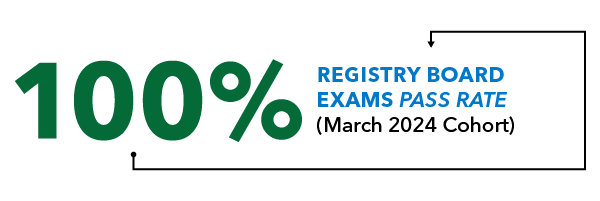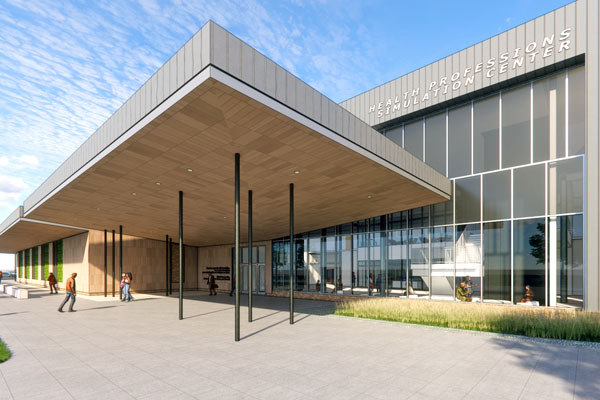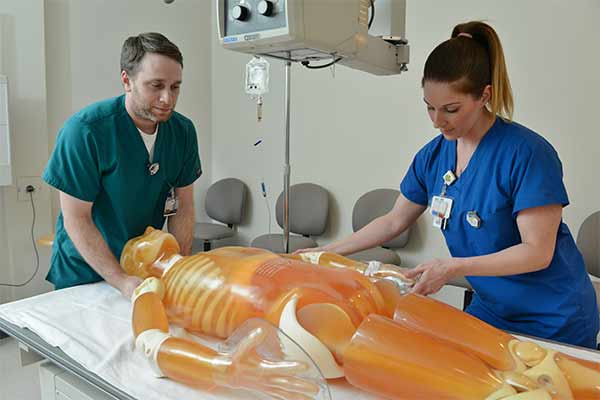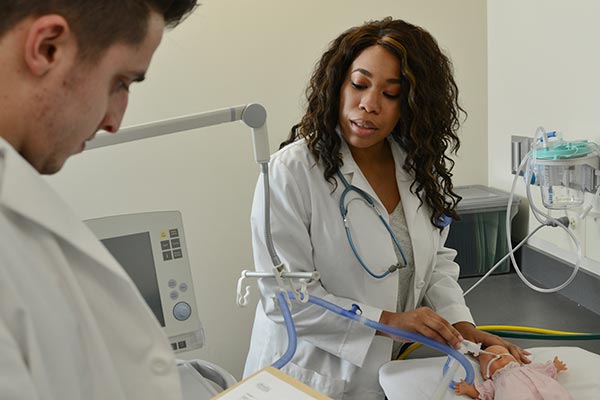New Health Science Building, Opening in 2027
In 2027, the health sciences programs will move to the new state-of-the-art Health
Sciences building on our Orchard Ridge Campus. Here, you will meet and work with expert
caring faculty, staff, and students in all the healthcare disciplines – just as you’ll
experience in the field.
Check out the New Facilities
A Growing Industry With High Pay
The federal Bureau of Labor Statistics predicts that employment of diagnostic medical
sonographers and technologists will grow by 10% from 2022 to 2032, much faster than
the average for all occupations.
Is Ultrasound Sonography Right For Me
To succeed as a sonographer, you need to have strong communication and interpersonal
skills to interact with patients and healthcare teams. You should be self-motivated,
with good physical health.
- Strong Communication: Effective verbal and written communication skills are essential for interacting with
patients and healthcare teams.
- Emotional Maturity: The ability to remain calm under pressure, respect patient privacy, and demonstrate
empathy is crucial in a fast-paced healthcare environment.
- Self-Motivation: Proactive learners with strong time management and problem-solving skills will thrive
in this demanding program.
- Dedication: A commitment to academic excellence and a willingness to balance coursework with
clinical responsibilities is required.
- Physical Fitness: Good physical health, including strength, stamina, and hand-eye coordination, is
essential for performing sonography procedures.
OCC Diagnostic Medical Sonography
I always knew that I wanted to pursue a career in Diagnostic Medical Sonography (DMS),
and OCC’s program was a natural choice for me. The program is highly regarded and
CAAHEP accredited, which makes advancing in the field after graduation much more accessible.
I also value that OCC offers the opportunity to earn an Associate in Applied Science
degree concurrently with the Registered Diagnostic Medical Sonographer (RDMS) certification.
Other programs require students to complete an associate degree before applying to
their DMS program.
I had a wonderful experience at OCC. Counselors provided guidance with scheduling
and financial aid, and the DMS instructors supported student success every step of
the way. OCC has an impressive sonography lab equipped with multiple ultrasound machine
models and simulators. This updated technology, combined with clinical rotations,
helps students become well-rounded sonographers.
The field of sonography has been incredibly rewarding and has opened many doors for
me. From working in hospital settings to a fertility clinic - and now as a travel
sonographer - I’ve experienced firsthand the versatility of this profession and the
opportunities for growth it provides.
Madeline, RDMS, RVT, OCC Graduate
What You Need to Be Successful in the DMS Program
To succeed in OCC’s DMS program you need to meet our program’s technical standards.
OCC’s Ultrasound Tech Program Basics
The DMS program is highly competitive and admits up to 15 students each year.
- Full-time commitment: The curriculum requires 15–20 hours a week of study time and 40 hours of classroom
and clinical practice three to five days per week.
- Face-to-face learning community: DMS classes meet in-person at the Southfield campus. You’ll have clinicals in medical centers across metro Detroit. In 2027 our Health
Sciences programs will be moving to the Orchard Ridge campus at our new state-of-the-art learning facility. Learn more.
Begin Your DMS Journey: Attend a Program Info Session
Register for a required information session. You will learn about:
- Program requirements
- Theory classes
- Labs
- Clinical phases
- How to succeed
1:00PM Virtual Event
Information sessions are mandatory for any student who applies to the Diagnostic Medical Sonography...
5:00PM Virtual Event
Information sessions are mandatory for any student who applies to the Diagnostic Medical Sonography...
2:00PM Virtual Event
Information sessions are mandatory for any student who applies to the Diagnostic Medical Sonography...
Classroom & Coursework to Prepare You for the Future
As a sonographer, you'll be at the forefront of patient care, using advanced technology
to assist physicians in the diagnosis of medical conditions.
Your coursework blends foundational courses in humanities and sciences with specialized
training in sonography.
- Sonography Theory
- Sonography Practice
- Fundamentals of Sonography
- Cross-Sectional Anatomy
- Abdominal and OB/GYN Pathological Imaging
- Sonography Principles and Instrumentation
These courses prepare for practical application in the following areas:
- Patient Care: Obtaining patient history, preparing patients for exams, and ensuring
patient comfort and safety.
- Image Acquisition: Operating ultrasound equipment, optimizing image quality, and document
findings.
- Clinical Judgment: Analyzing images, determining exam scope, and communicating results
to physicians.
Hands-on Experience at Local Area Hospitals
After you have been selected for the program, you will have clinical assignments in
the last year of the program.
- Clinical sites can be up to a 100-mile radius of the campus and assigned by the program.
- Day/evening didactic classes and clinicals
- Professional attire required with no visible piercings or tattoos.
- Strict academic and attendance policies apply.
Your clinical assignments will be held at our affiliated hospital partners, which
currently include:
- Corewell Health
- Detroit Medical Center
- Henry Ford Health System
- John D. Dingell VA Medical Center
- McLaren
- Michigan Medicine
- Trinity Health
Join a Network of Sonographers
After admission into the DMS program, you may obtain a student membership to the Society of Diagnostic Medical Sonography (SDMS). With this membership, you will have access to:
- Grants/Scholarships
- Career Resources
- Annual Conference
- Journal/articles
Earn Your Registry Credentials
After successfully completing the program, you’ll be ready to take the national credential
examination offered by the American Registry of Diagnostic Medical Sonography.
This exam will qualify you to practice as a Registered Diagnostic Medical Sonography (RDMS) in the United States.

A Career With Endless Possibilities
Want to advance your career beyond a sonography degree? OCC has partnered with Concordia
University, Oakland University, Wayne State University and more to offer seamless
transfer options for a bachelor's degree in:
- Applied Health Sciences
- Diagnostic Medical Sonography
- Public Health
- And more!
Becoming a Diagnostic Medical Sonographer at OCC
The DMS program leads to an Associate in Applied Science (AAS) degree. It’s an “Extended
Degree Program,” which means you complete 89 credit hours for graduation. (Yes, your
prerequisites count in this total.)
Prerequisites, Preparation & Applying
Before acceptance into the OCC DMS program, you will have to complete the following
requirements in your first two years:
Register for a required DMS information session. Find a session that works best for
you.
The time it takes to become eligible for the DMS program varies for each student.
Most students complete their prerequisites in one year.
- Aim for a 4.0 GPA: You must earn at least a “B” in the required prerequisites courses. Our application
pool is competitive, so the higher your GPA, the more likely you are to be admitted.
- Your prerequisites count: Our admissions committee uses a weighted scale that favors the grades you earn in
these courses:
- Trigonometry (MAT 1560)
- Medical Terminology (MDA 1103)
- Anatomy & Physiology (BIO 2630 & 2640)
- Composition II (English 1520) OR Professional Communication (English 2200)
- The weighted scale also considers the number of times you repeat a course to achieve
the minimum required "B" or higher grade.
Diagnostic medical sonography is a rewarding career that demands precision, critical
thinking, and compassion. You are highly recommended to complete 40 hours of volunteer
work in a healthcare setting of your choice.
We use your results on the Health Education Systems Incorporated (HESI) Entrance Exam to weigh your application. Every year the HESI deadline is published for first time
test takers. For 2025, first time tests must be completed prior to November 21. Your goals:
- Reading: 75th percentile or higher (includes grammar and vocabulary sections)
- Anatomy & Physiology: 75th percentile
- Do both in the same testing session.
- You get two retakes: If you need a third retake, you must wait six months after your
second retake date to attempt the exam for a final time.
Applications are due before December 15, admission selections are revealed before March 31. After successful completion of the prerequisites above, you will:
Meet with DMS Counselor: you will meet with your counselor to complete the official DMS application for admission when you are nearing completion
of all prerequisites.
Attend a Record Review Session: After submitting your application you will attend a “record review”. This is an
hour-long session where you will meet with the DMS selection committee in person to
talk through your academic preparation, your volunteer experiences, and your career
goals.
Other Eligibility Requirements
After acceptance to the program all sonography students must maintain current health
records, CPR certification, and TB clearance. For detailed program policies, contact the DMS program director.
You must pass a criminal background check to be admitted to the sonography program.
Felonies within the past 15 years or misdemeanors within the past 10 years may disqualify
you from the program.
You must pass a drug test to be admitted to the DMS program. Drug use is prohibited
on campus and in clinical settings. Details about the drug testing process will be
provided to admitted students.
You are highly recommended to have health insurance, as the college does not cover
accidents or illnesses.
Physical exams and immunizations, including Tuberculosis (TB) tests or chest X-rays,
are required before starting clinical.
Required vaccines: Measles, mumps, rubella, varicella (chickenpox), Tdap, Hepatitis
B (or declination of immunity), and annual influenza.
If you are placed at a clinical site that requires a specific vaccine or if the requirements
of your site change at any time, you will be required to provide proof of prior vaccination
or you will be required to get the vaccine. Otherwise, you will be dismissed from
the program. You will not be moved to a different site.
Remember, you may be at multiple clinical sites during the program, so there is a
very good chance that you will be required to get the necessary vaccines at some point.
**NOTE: This is subject to change at any time!
You must have a current BLS Healthcare Provider Certification before starting clinicals.
Certification must be maintained.
Credentials Received & Accreditation
The program prepares selected individuals through theory and clinical experiences
to practice as a Sonographer in a variety of health care settings. The program prepares
competent entry-level sonographers in cognitive (knowledge), psychomotor (skills)
and affective (behavior) learning domains for the following concentrations: Abdominal
sonography- Extended and Obstetrics and Gynecology sonography.
Graduates must pass the national credential exam offered by the American Registry of Diagnostic Medical Sonographers to practice as a registered diagnostic medical sonographer, or RDMS.
The Diagnostic Medical Sonography Program is accredited by The Commission on Accreditation of Allied Health Education Programs (CAAHEP) upon the recommendation of the Joint Review Committee on Education in Diagnostic
Medical Sonography (JRC-DMS).
9355- 113th Street N #7709
Seminole, FL 33775
727-210-2350 | caahep.org
6021 University Boulevard, Suite 500
Ellicott City, MD 21043
443-973-3251 | jrcdms.org
Enroll Now
Begin your studies with these steps:
Prepare to Transfer – Even if You Are Not Planning to Today!
By planning early and working with an OCC Counselor throughout your OCC experience you will be able to maximize your OCC applicable credits
upon transfer. If you are pursuing an associate in applied science you may be able
to satisfy the Michigan Transfer Agreement by taking as few as four additional courses, saving you time, money and aggravation!
Regardless of your program of study, OCC has many Transfer Credit Agreements with colleges and universities to assist with navigating your way to a bachelor’s
degree. Visit the College Transfer Success Guide webpage for additional information and resources.





